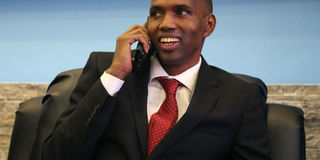Premium
Somalia’s president picks Hassan Ali Kheyre as PM

Somalia's newly appointed Prime Minister Hassan Ali Kheyre talks on the phone in Mogadishu on February 23, 2017. PHOTO | AFP
What you need to know:
- From 2014, Mr Kheyre has been the executive director of British firm Soma Oil & Gas that is exploring on 12 offshore oil and gas blocks.
- Kheyre promised to tirelessly work with the president and try to form a government that represents the public.
MOGADISHU
Somalia’s President Mohamed Abdullahi Farmajo has appointed Mr Hassan Ali Kheyre as his prime minister.
The announcement was made today, a day after the president’s inauguration ceremony held at a heavily guarded airport zone in the capital Mogadishu.
Mr Kheyre, a Somali-Norwegian, is a former regional director (Horn of Africa and Yemen) of Norwegian Refugee Council, a charity organisation, between 2006 and 2014.
From 2014, Mr Kheyre has been the executive director of British firm Soma Oil & Gas that is exploring on 12 offshore oil and gas blocks covering around 60,000 square kilometres in Somalia.
In December last year, Britain’s Serious Fraud Office closed an investigation into Soma over bribery allegations after finding “insufficient evidence to provide a realistic prospect of conviction”.
Somalia and Eritrea Monitoring Group had also accused the Soma’s executive director Kheyre of having links with extremist groups such as Al-Shabaab, allegations which were investigated by the Serious Fraud Office.
After his nomination Kheyre — also spelt Khaire — promised to “tirelessly work with the president and try to form a government that represents the public”.
Tensions between Somali presidents and their prime ministers in recent years have frequently stymied government business and undermined political progress in the fragile Horn of Africa nation, so the relationship between the two men will be crucial.
HARD TASK
Mr Kheyre is a political newcomer and, like President Farmajo, is from the diaspora.
The president holds dual American and Somali citizenship.
The 49-year-old is a close associate of former president Hassan Sheikh Mohamud and a member of the Hawiye clan, meaning his nomination maintains the traditional clan balance alongside Farmajo who is a Darood.
He now awaits Parliament approval after which, in consultation with the president, he will appoint members of the Cabinet, who must also be approved by the legislators.
The president, widely known by his nickname Farmajo, officially took office last week, but his inauguration was held on Wednesday in the presence of several regional leaders.
The ceremony took place in the highly secured airport zone to avoid an attack by the Al-Qaeda linked Shabaab group, which has threatened a “vicious war” against the new government.
The election of the no-nonsense Farmajo — whose brief stint as prime minister in 2010-11 is fondly remembered — sparked elation in a country desperate for an end to decades of conflict and anarchy.
But he warned the country that there would be no quick fixes.
“Your problems were created during 20 years of conflict and droughts. A solution will need more than another 20 years,” he said.
FOOD AID
Mr Farmajo said he would focus on “the basic essential problems” but that his work would have to be carried on by future governments.
President Uhuru Kenyatta, Djibouti’s President Ismail Omar Guelleh and Ethiopia’s Prime Minister Hailemariam Desalegn, as well as delegations from Kuwait and Egypt, attended the ceremony.
Mr Farmajo said that insecurity along with a cycle of droughts were the main challenges facing his administration.
The UN says about six million Somalis need humanitarian assistance, and three million are in the official “crisis” and “emergency” zone of food insecurity, which means they are suffering acute malnutrition and going long periods without meals.




